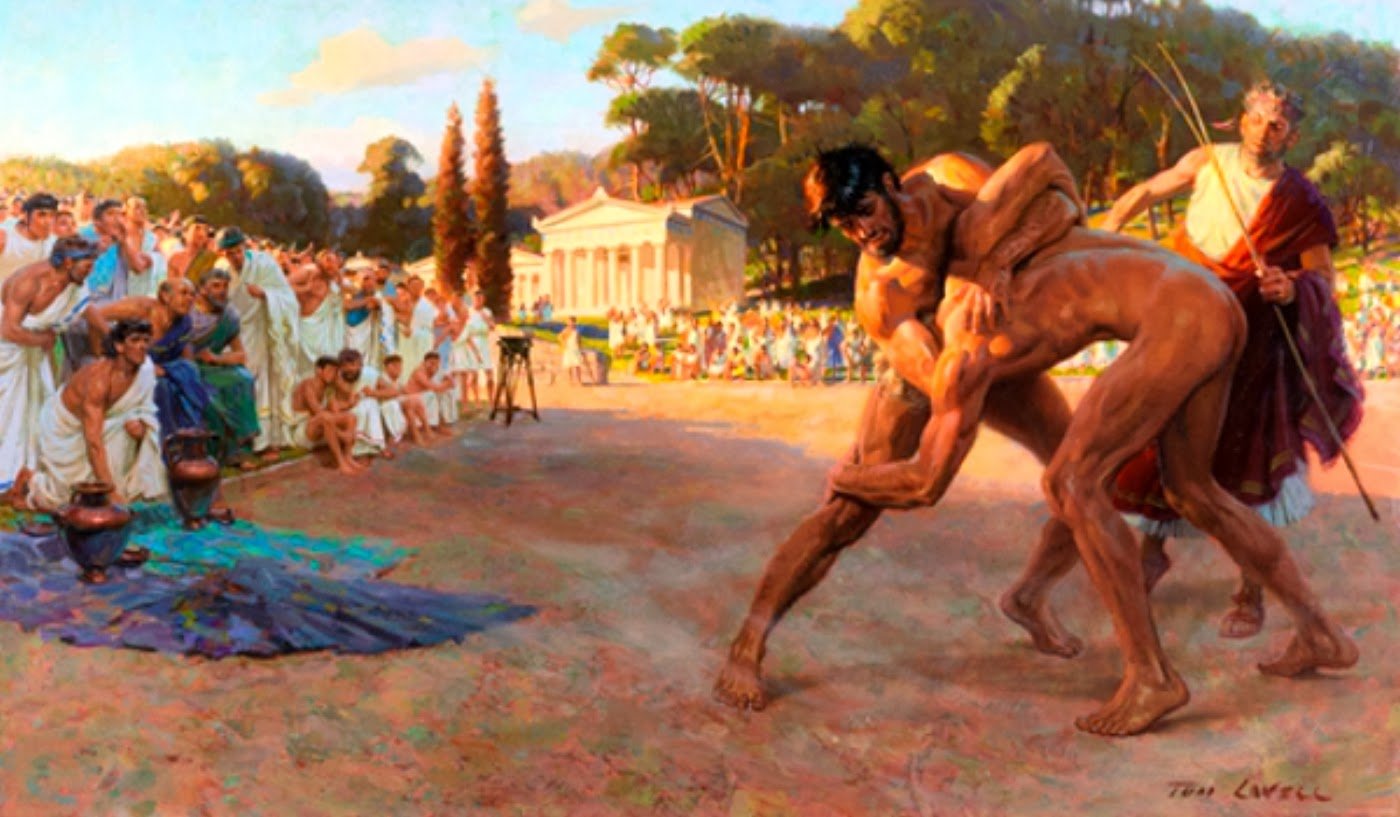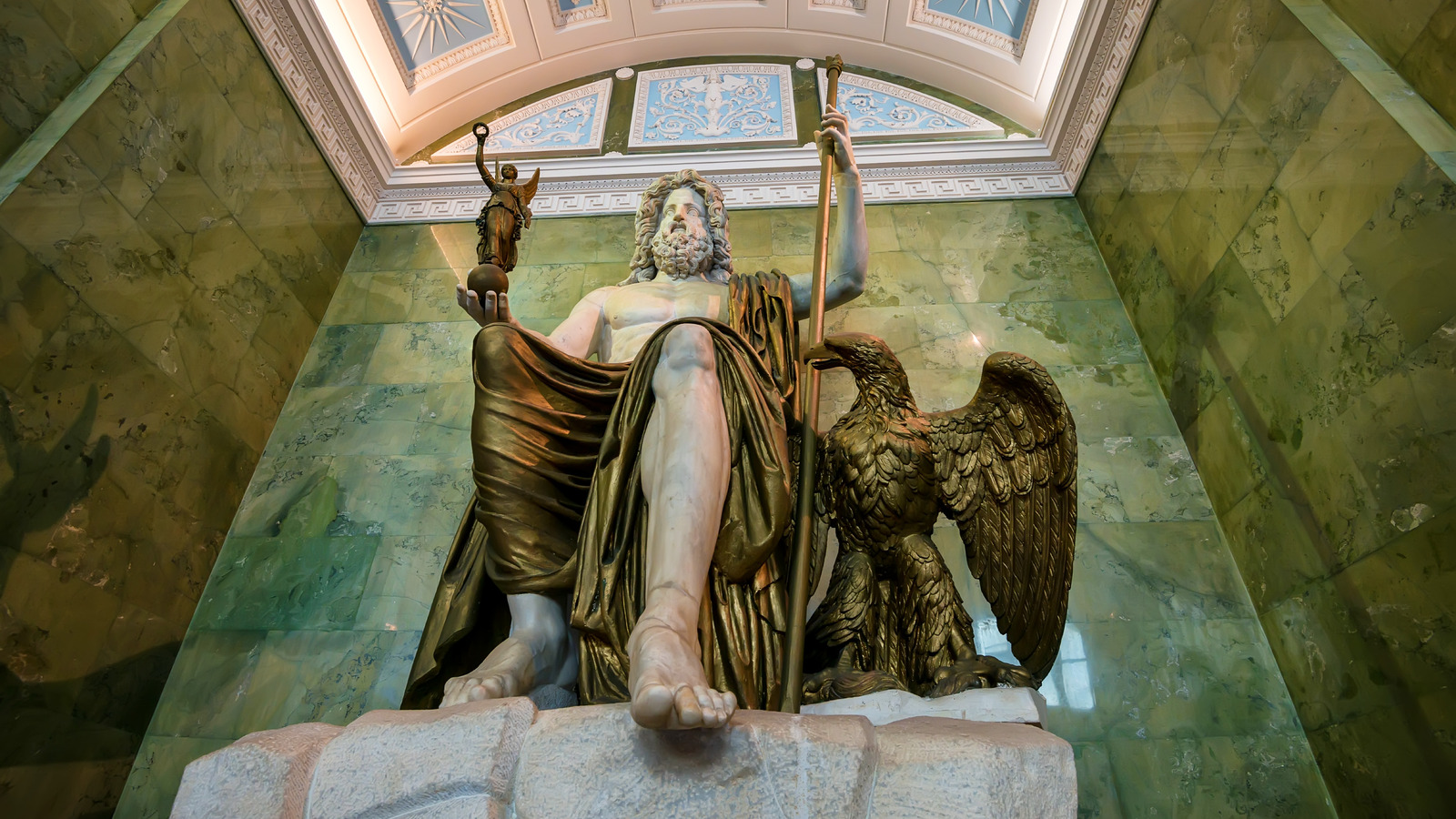The Ancient Greek Olympics games started in 776 BC. Between 1000 – 1500 years later in 1896, the Olympic games were brought back again as the modern Olympics and the event kicked off in Athens, Greece. Christian Roman Emperor Theodosius banned pagan practices in 391 AD, so the Olympic games soon came to an end. So in short terms, Emperor Theodosius was the one who stopped the ancient Olympic games.

The first Olympic Games were held in Olympia, Greece, in 776 BC. The Olympic games are held every four years to honor the king of the gods in the Olympic stadium in the rural Greek town of Olympia. So, the Olympic games were really a religious festival and as much as a sporting event dedicated to the god Zeus.
A temple with a giant statue of Zeus once stood at the site. The statue was 40 feet tall and was one of the Ancient Wonders of the World. It was destroyed in the Century AD. This image is a model of how it might have looked, at the Louvre museum in Paris.
How Long Does the Olympic Games Last?
The Olympic Games or sport as a festival lasted 5 days but the first 2 ½ days were taken up by prayers, sacrifices and processions.
Before the games began, 100 oxen were sacrificed. The games are so important that a truce or echeveria is called across the city-states of Greece, meaning all wars or disputes must be paused so that athletes and spectators can travel safely to and from Olympia.
For the first thirteen games of the Ancient Greek Olympics, there was only one event, and that was the two-hundred-yard dash. In time, new exciting contests were developed, such as combined running, jumping, wrestling, javelin throwing, boxing, chariot and mule racing, hurling, footraces, discus, and the pankration, a brutal fight that allowed every type of attack except only biting and eye-gouging.
By the practise and rules of the ancient Olympic Games, participants were allowed to wear pants while training but must be naked and covered in olive oil when they performed during the games.
Who Invented the Ancient Greek Olympics
The demigod Heracles (Herakles) founded the Olympic games.
This event is described by Pindar, a Greek poet, in his tenth Olympic Ode, where he mentions that Heracles founded the games to honor Zeus after completing his labors, which included the famous task of cleaning Augeas’ stables. Heracles was a great wrestler and a supreme pankaratist, who won many matches without holding back.
Ancient Olympic wrestlers grappling in nakedness
What Type of People Could Take Part in Ancient Greek Olympics?
- Only Individuals: There were no teams, everyone was in it for themselves.
- Only Greeks: Other countries did not compete, just individuals from the different Greek city-states. Athletes had to prove athletes had Greek ancestors.
- Only Men: women were not allowed to compete or become trainers. To make sure of this, the competitors and trainers were naked! Married women were not even allowed to watch.
Ancient Greek Olympics Sportlike Events
For the first 13 Olympic games festivals, there was only one event – a 200m running race called the stadion.
Then they began to add others until there were 20 different events. Here are some of the more famous events in the Ancient Greek Olympics.
Race
In the race category, there is a 185-meter-long straight track in the stadium where races are held. Up to 20 men could run in one race. Stadion race covered one full length of the track, the Diaulos race covered two lengths of the track, and the Dolichos race covered two and a half lengths.
Aside these three, there is the Hoplitodromos race. The Hoplitodromos race is a race in Greece in which runners run in full military armor in 40-degree heat. That is, a race in war armour – a helmet, greaves (metal leg armour), and a shield, which all weighed around 6kg. The hoplitodromos acted as a good training exercise for soldiers. People could only participate individually – there were no teams, and everyone was in it for themselves.
Only Greeks – other countries did not compete, just individuals from the different Greek city-states. Athletes had to prove they had Greek ancestors. Only men – women were not allowed to compete or become trainers. To make sure of this, the competitors and trainers were naked! Women were not even allowed to watch. Perhaps the greatest ever Olympic athlete was Leonidas of Rhodes. He won the stadium, diaulos, and hoplitodromos at four consecutive Olympic Games, from 164BC to 152BC. He won 12 olive wreaths (the equivalent of a gold medal).
Long Jump

The Greek long jump was a bit different. The long jump involves athletes jumping as far as they can while carrying weighty objects in their hands instead of a long run-up. Usually, there is a musician playing the flute to help get them into a swinging rhythm during the long jump and help them concentrate. Athletes held weights (up to 2kg each) in their hands and swung them to help move their bodies forward. These weights were usually made from stone and called halters. Nobody properly recorded the distance jumped because it only mattered who jumped the furthest each time.
In 664 BC, Chionis of Sparta was said to have jumped over 15 meters. This is about as long as 8 beds so it must have been exaggerated!
4-horse Chariot Race
The 4-horse chariot race was an exciting event to watch. One horse is as strong as 10 men so athletes can imagine how powerful 4 horses would be! The sound must have been deafening. Crashes and injuries were unavoidable. The horses raced 12 times around the track, covering 14,000m. Some winning horses had their own tombs as a special honour.
The winner of the chariot race was not the driver, or even the horses – it was the owner. This meant that a woman could have won!
In 396 BC a Spartan princess called Cynisca entered her horses in the chariot race and won. This was the first woman (Kynisca) to win at the Olympics. In two consecutive Olympics, she won the four-horse Chariot race. Her victories have encouraged women throughout Greece to participate in horse events. Today, she has a bronze statue in the Olympian temple of Zeus.
“I declare myself the only woman in all Hellas (Greece) to have won this crown.“The inscription said.
Two-horse Chariot Race and a Horse Riding Contest
Two-horse Chariot Race
The chariot races is horse-riding race which is very violent, as horse riders and their horses hitting, smash, and bash other riders as they race.
Javelin
Ancient Greek Javelin Throwers Depicted on a Vase
The javelin was a sharpened piece of wood, similar to a spear (one of the main weapons of a Greek warrior). The Greek javelin event was different from the modern version because a leather strap was used to help throw it further.
Discus

Discus is a throwing event where athletes throw a heavy disc of bronze, iron, or stone as far as they can. The discus throwing was the only event that didn’t seem to relate to warfare or life in some way. Discuses were made from stone, iron, lead, or bronze. Often, they would be decorated with a dedication to one of the Gods, pictures, or poetry. In Greek mythology, Perseus and Apollo both killed loved ones by accident with discuses.
Boxers
Boxers wore soft leather straps on their hands. There were no weight categories so their opponent could be much heavier than the athletes. If nobody was winning there would be a klimax. This meant the boxers took turns hitting each other without being blocked until one was knocked out.
Wrestling

Wrestling was very popular back then. Though unlike today where we have numerous wrestling weight classes used in wrestling matches, then there was upright wrestling where the winner was the man who threw his opponent to the floor 3 times and ground wrestling where the loser was the first to give in by raising their finger or passing out.
Pankration

Pankration was a brutal cross between boxing and wrestling. There were only two rules: no biting and no eye gouging. Combat sports were done in the nude and covered in oil. There was no reward for 2nd or 3rd place so winning was important. Some competitors were willing to risk their lives to win. One year there was a competitor in the pankration called Arrhachion. He was being strangled but he managed to dislocate his opponent’s toe. The other man gave in before Arrhachion died and so Arrhachion won! They even placed an olive crown on his dead body.
Pentathlon

Greeks also participated in Pentathlon which is a type of competition that comprises 5 sports events running, jumping, discus, javelin, and wrestling.
When an athlete wins an event or multiple events, he/she gets a wreath of leaves and becomes a legend in their home cities, touched by the gods.
Today, the Summer and Winter Olympics bring international world-class athletes together by the thousands, uniting fans by the billions for the world’s foremost sporting competition. Citius, Altius, Fortius. Three cheers for the Olympics. There are some Olympic traditions from the modern version, such as the torch and the rings.






